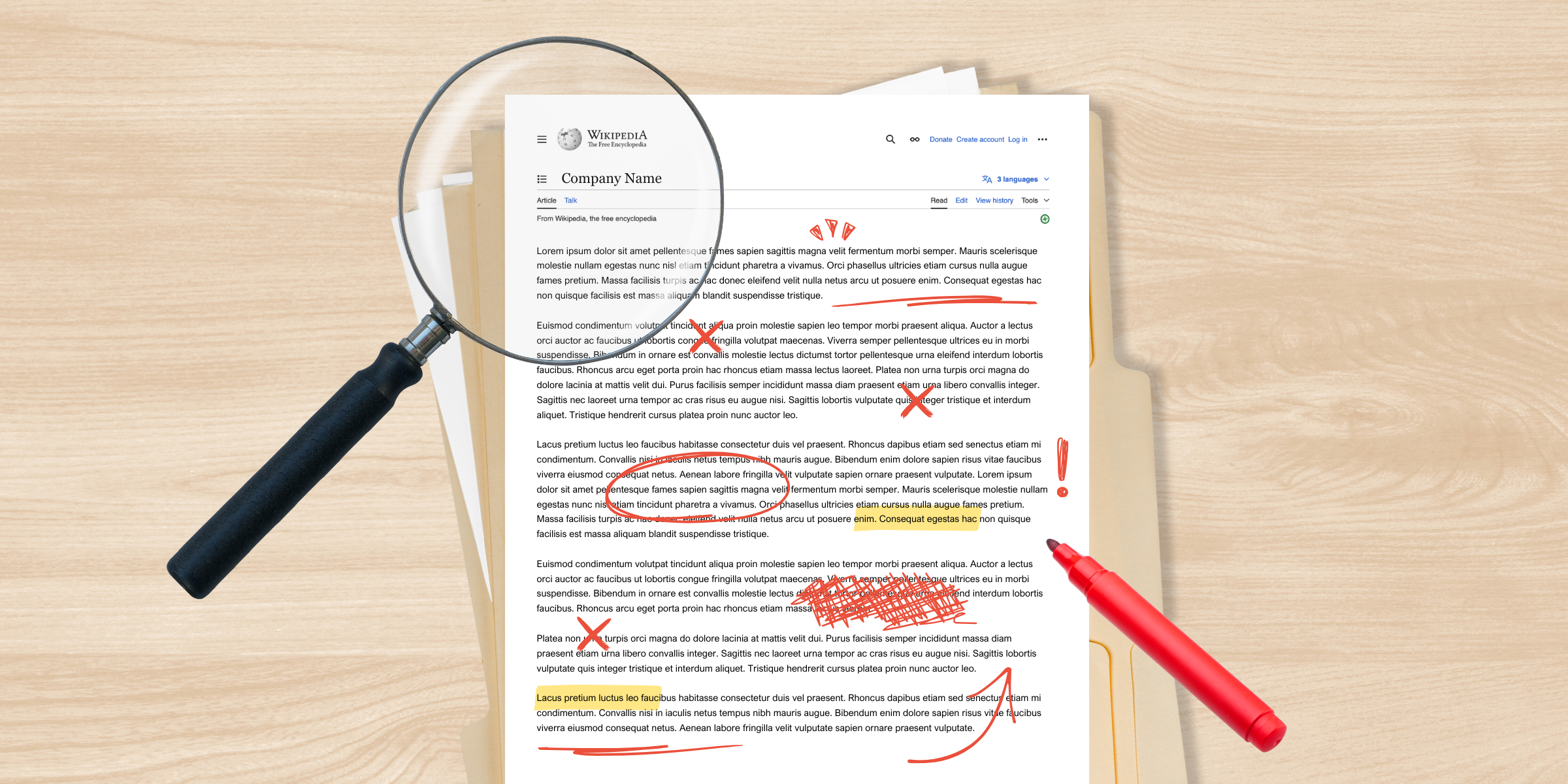Why Wikipedia Should Treat Company Articles More Like Biographies
Companies and people have some surprising similarities. Both are born, grow, change, and die. Both can win awards, have official websites, and become mired in controversies that threaten their reputations. But they have some important differences, too. Companies can’t cry, feel pain, or binge true crime podcasts. While the legal doctrine of corporate personhood is protected under U.S. law, it’s no surprise Mitt Romney was mocked during the 2012 presidential election for saying, “Corporations are people, my friend.”
Even Wikipedia treats companies and people similarly—up to a point. Articles about companies and biographies share structural parallels: introductions summarize claims to notability, infoboxes display key facts and visual identifiers, and sections like “History” map neatly onto “Early life”. People and companies are more alike than it may initially appear. But only one enjoys meaningful protection under Wikipedia’s policies.
The Case for BLP Protections
Wikipedia’s Biographies of Living Persons (BLP) policy gives editors stronger footing for removing false or poorly sourced content about individuals. It says (emphasis in original):
Contentious material about living persons … that is unsourced or poorly sourced—whether the material is negative, positive, neutral, or just questionable—must be removed immediately and without waiting for discussion.
That’s as clear a rule as anyone will find on Wikipedia, and it’s a good one. Publishing libel, lies, or careless representations about a person on Wikipedia can cost people jobs, embroil them in investigations, or even lead to physical harm. The BLP policy is further supported by an active noticeboard where violations can be flagged and addressed promptly.
But no comparable protections exist for companies or organizations. In fact, volunteer editors are often so cautious about fixing problems with company entries, it can feel like the inverse of BLP: contentious claims in company articles, even if poorly sourced, often remain even after thorough discussion.
The problem for companies is obvious, but the problem for Wikipedia should not be overlooked. This double standard undermines trust in Wikipedia’s business-related content and in Wikipedia’s ability to manage conflict of interest (COI) situations effectively. Worse, it drives some company representatives to resort to rule-breaking when rule-following approaches fail. We have seen it happen.
Why This Happens
Wikipedia suffers from a kind of collective action problem when it comes to company articles. Most editors prefer these articles to be accurate but have little interest in working on them, and are often wary of being seen as overly friendly to corporate interests.
Meanwhile, a small minority of highly motivated editors dominates this space, often with hostile attitudes toward COI contributors—even those who follow Wikipedia’s established rules. Some fear that accommodating paid editors will harm Wikipedia’s credibility; others simply resent the idea of anyone being paid to edit. A few are outright trolls. Pragmatic editors who address the content over the character of the requester are fewer, and those who do participate are often harassed by the "COI is evil" crowd.
This dynamic leads to broken articles that no one has the will to fix and COI guidelines that fail in practice. It also creates incentives for frustrated companies to engage in unethical editing tactics, which only worsen the problem.
Potential Solutions
To solve this issue, the Wikipedia community first has to recognize that articles about companies and organizations are in a different class than articles about whales or sports. Epistemology can't absorb other branches of philosophy via hostile takeover, after all. Once that happens, we have a couple of ideas for how these protections could be implemented.
1. Expand BLP to Include Companies
There's no need to reinvent the wheel here. The BLP policy is a good one. It is strong and the community is active with its enforcement. Amending the BLP policy to include companies and organizations would provide editors with a stronger basis for addressing contentious, poorly sourced material in these articles and make it more likely that decisive action would be taken. That could be as simple as a single sentence in the policy introduction.
2. WikiProject Companies codifies guidelines for company articles
If the appetite for amending a core policy isn't there, WikiProject Companies could simply add BLP to its list of article guidelines, or specific elements from the BLP policy that are most relevant. There, it wouldn't necessarily have the same impact that amending the BLP policy would (for example, we don't see a way that users at the BLP Noticeboard would accept an influx of company notices), but it would have significantly more teeth.
3. Write a New Policy
A more comprehensive—though admittedly ambitious—approach could involve creating a standalone policy for company articles, with clear guidelines for handling contentious material, timelines for addressing requests, and pathways for escalating unresolved issues. In fact, it’s been nearly 20 years since the Wikipedia community last introduced a new formal policy: the BLP policy itself, adopted in December 2005.
Adopting such a policy for company articles would undoubtedly require a significant mindset shift within the community, where sympathy for corporate entities is often in short supply. But it’s worth at least considering: policy should be a tool, and extending BLP-level protections to company articles would ensure more consistent enforcement across Wikipedia.
What Comes Next
We don't anticipate these changes would be accepted by the community overnight, or even any time soon. After all, Wikipedia does not have a deadline. But we hope that this might be the start of a bigger conversation and the beginning of a change that benefits both Wikipedia and the corporate entities it covers. If this is a conversation you want to be a part of, please leave a note on Bill Beutler's Wikipedia Talk page.

